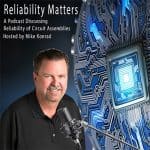
Backup Balance
Abstract
Kirk and Fred discussing how much we should invest in backup power or systems redundancy to prepare for rare weather or use conditions.
ᐅ Play Episode
Your Reliability Engineering Professional Development Site

Kirk and Fred discussing how much we should invest in backup power or systems redundancy to prepare for rare weather or use conditions.
ᐅ Play Episode
by Michael Pfeifer, Ph.D., P.E. Leave a Comment

In this episode Michael discusses the metals engineering perspective to component design. The concepts actually apply to all materials – metals, polymer, ceramics, and new classes of materials.
No matter the application, the considerations when designing a component are always the same. It’s necessary to understand all the design requirements when selecting materials and finalizing a component’s shape and features. The design requirements include performance, reliability, weight, cost, how the component will be fabricated, and how it will be joined to other components. With this information it’s possible to identify alloys and make changes to the component’s shape and features as needed to meet the design requirements at low-cost. Often, trade-offs between component materials and form are made to optimize the design. This is especially important for design for manufacturability to keep costs down and ensure a receptive supply base.
by Dianna Deeney Leave a Comment

We’re in our 5th episode of our series about generating ideas with our team toward action. The first two episodes were all about idea generation. The 3rd was about grouping and exploring ideas. The 4th was about screening ideas. Now, we’ll look at ways to compare ideas.
We’re still considering that we’re just after brainstorming, at the point where we have many ideas and no next steps.
Let’s compare ideas with our team so we can move toward action. We explore these Quality Tools and how to use them after a brainstorming or other idea-generating team activity:
by Fred Schenkelberg Leave a Comment

We have many options to learn reliability engineering—books, magazines, newsletters, conferences, seminars, etc. We have options. Some options are better than others, depending on what you want to know. Likewise, some options are better than others, depending on what you want to share.

Kirk and Fred discussing technical papers, which Fred and Kirk have a few on the website Research Gate, and the role they play in the reliability engineering world.
ᐅ Play Episode

Carl and Fred discussing the broad subject of assumptions, and how they impact reliability analysis and applications. When are assumptions good and when are they questionable?
ᐅ Play Episode
by Akshay Athalye Leave a Comment

by Dianna Deeney Leave a Comment

We’re in our 4th episode into our series about generating ideas with our team toward action. The first two episodes were all about idea generation. The 3rd was about grouping and exploring ideas.
We’re still considering that we’re just after brainstorming, at the point where we have many ideas and no next steps.
Let’s instead screen our ideas so we can move toward action. We explore these Quality Tools and how to use them after a brainstorming or other idea-generating team activity:
by Mike Konrad Leave a Comment

We are all aware of the “oldest profession in the world”. Perhaps the second oldest profession is counterfeiting. Whenever a product is introduced, a counterfeit version soon follows. While the electronics industry has experienced counterfeit components from its inception, recent events such as the pandemic and supply chain shortages have fueled the counterfeit industry.
Statistics by the Semiconductor Industry Association (SIA) reveal that the counterfeiting of electronic parts in the US alone, cost the chip industry more than $7.5 billion in revenue annually. According to new data from the ERAI, a global information board for counterfeiting, reports of counterfeit electronic products are growing. Although it is difficult to put an exact figure on just how many counterfeit products are in circulation, estimates suggest that consumer and industrial businesses lose approximately $250 billion each year due to counterfeit parts.
To talk more about counterfeit components and detection technologies, I invited Dr. Eyal Weiss, Founder and CTO of Cybord to be my guest. Dr. Weiss received his Ph.D. in Electronic and Computer Engineering from BGU (Ben-Gurion University) in Israel
As well as a Masters in Plasma Physics and bachelors cum laude in Mechanical Engineering from the Technion–Israel Institute of Technology.
He worked as a researcher on pulsed plasma at Soreq Research Center (SNRC). He then worked as a technology department manager in the high-tech fiber-optics industry. He was the technology manager at Lynx Photonics and then at Explay, developing state-of-the-art Silicon and optical chips production, packaging, and assembly production lines. He developed a new fiber-pigtailing and packaging technology and built full-scale production lines utilizing this new technology.
He returned to Soreq SNRC and for 15 years served as manager and leading scientist of the R&D Systems Department. He built mass-production lines and assembly lines for new sensors technology and developed their test equipment. He has twice received the prestigious Israel Defense Prize.
In 2018, he founded and became CTO of Cybord, developing electronic component qualification and authentication technologies. He is a member of the Israel Innovation Authority, Euramet, SAE, and IPC committees. He specializes in multidisciplinary technology development and has received significant awards and accolades in the fields of machine learning, plasma physics, optical assemblies, laser technology, and electromagnetics.
Dr. Weiss is an expert in technology development and manufacturing technology and has published over 20 peer-review articles, 4 patents, and a book, and, I’m happy to say, he’s my guest on this episode of the Reliability Matters podcast.
by Carl S. Carlson Leave a Comment

Carl and Fred discussing a question received by an Inside FMEA reader on the subject of FMEA occurrence rating.
ᐅ Play Episode
by Mike Konrad Leave a Comment

David Raby is President of Madison Alabama-based STI Electronics, a contract manufacturer for the EMS industry. David worked at the family business since he was a child and eventually took over the family business when his father (and company founder) Jim Raby retired.
The electronics industry moves at the speed of light and any business within the EMS industry must learn to stay ahead of technology and trends. David shares some of his experiences in taking over the family business and some of the challenges his business (and many other businesses) face on a near daily basis.
David Raby’s Contact Information:
draby@stiusa.com
by Christopher Jackson Leave a Comment

Chris and Fred discuss your approach for estimating the reliability of a new product, with new technology, manufactured in a new facility? … wow!
ᐅ Play Episode
by Michael Pfeifer, Ph.D., P.E. Leave a Comment

Metals engineering is the application of metallurgy (the science of metals) to design and manufacturing decisions and problems involving metals. In this episode I explain the fundamental principles of metallurgy and how they are applied to engineer metals for component design and solving component failures and production quality problems.
by Akshay Athalye Leave a Comment

by Dianna Deeney Leave a Comment

We’re in our 3rd episode into our series about generating ideas with our team toward action. The previous two episodes were all about idea generation.
We’re now at the point where we have many ideas and no next steps.
Let’s group and explore our ideas so we can move toward action. We explore these Quality Tools and how to use them after a brainstorming or other idea-generating team activity:
 Ask a question or send along a comment.
Please login to view and use the contact form.
Ask a question or send along a comment.
Please login to view and use the contact form.